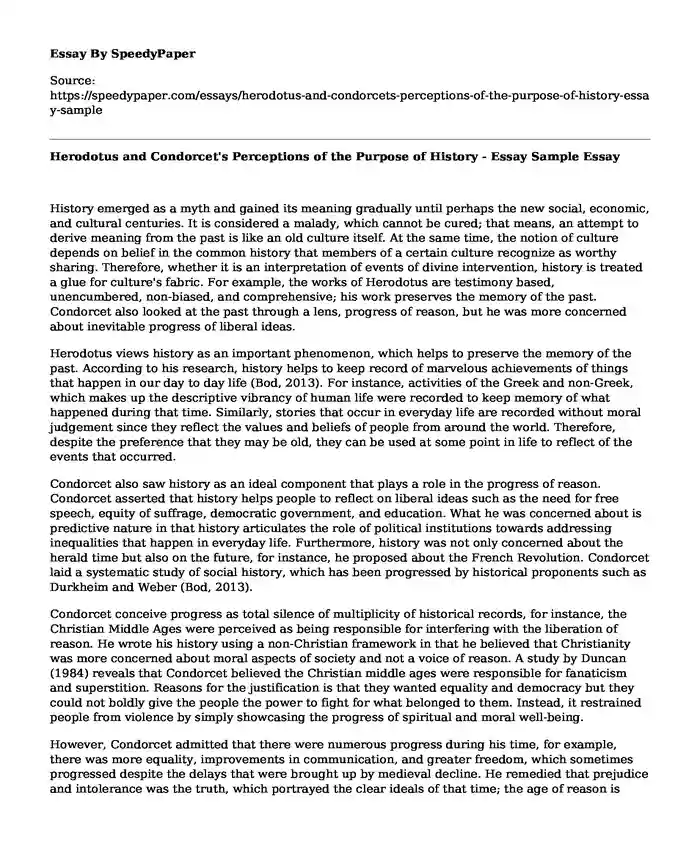History emerged as a myth and gained its meaning gradually until perhaps the new social, economic, and cultural centuries. It is considered a malady, which cannot be cured; that means, an attempt to derive meaning from the past is like an old culture itself. At the same time, the notion of culture depends on belief in the common history that members of a certain culture recognize as worthy sharing. Therefore, whether it is an interpretation of events of divine intervention, history is treated a glue for culture's fabric. For example, the works of Herodotus are testimony based, unencumbered, non-biased, and comprehensive; his work preserves the memory of the past. Condorcet also looked at the past through a lens, progress of reason, but he was more concerned about inevitable progress of liberal ideas.
Herodotus views history as an important phenomenon, which helps to preserve the memory of the past. According to his research, history helps to keep record of marvelous achievements of things that happen in our day to day life (Bod, 2013). For instance, activities of the Greek and non-Greek, which makes up the descriptive vibrancy of human life were recorded to keep memory of what happened during that time. Similarly, stories that occur in everyday life are recorded without moral judgement since they reflect the values and beliefs of people from around the world. Therefore, despite the preference that they may be old, they can be used at some point in life to reflect of the events that occurred.
Condorcet also saw history as an ideal component that plays a role in the progress of reason. Condorcet asserted that history helps people to reflect on liberal ideas such as the need for free speech, equity of suffrage, democratic government, and education. What he was concerned about is predictive nature in that history articulates the role of political institutions towards addressing inequalities that happen in everyday life. Furthermore, history was not only concerned about the herald time but also on the future, for instance, he proposed about the French Revolution. Condorcet laid a systematic study of social history, which has been progressed by historical proponents such as Durkheim and Weber (Bod, 2013).
Condorcet conceive progress as total silence of multiplicity of historical records, for instance, the Christian Middle Ages were perceived as being responsible for interfering with the liberation of reason. He wrote his history using a non-Christian framework in that he believed that Christianity was more concerned about moral aspects of society and not a voice of reason. A study by Duncan (1984) reveals that Condorcet believed the Christian middle ages were responsible for fanaticism and superstition. Reasons for the justification is that they wanted equality and democracy but they could not boldly give the people the power to fight for what belonged to them. Instead, it restrained people from violence by simply showcasing the progress of spiritual and moral well-being.
However, Condorcet admitted that there were numerous progress during his time, for example, there was more equality, improvements in communication, and greater freedom, which sometimes progressed despite the delays that were brought up by medieval decline. He remedied that prejudice and intolerance was the truth, which portrayed the clear ideals of that time; the age of reason is volatile. Moreover, Condorcet described history as a spiral path that helps people to achieve their desired goals (Duncan, 1984). The pattern of civilization was only seen in civilization; this means the concept of progress was more of a priori than posteriori.
Herodotus was not concerned with progress, but the history that verifies the cyclical pattern on the basis of civilizations. Herodotus was curious about everything that happened during his time. He wanted to hear stories, make conclusions, and record them for future references. Herodotus saw history as a powerful tool that reflected on how people used to act, and at the same time, how methodological considerations shaped the view of the past. He was more concerned about investigating on how mankind does things including learning about their cultural behaviors.
Herodotus applied historical principles of vigor from un-critical storytelling to critical activity. His emphasis is explicit in instances such as the repeating patterns of rise, fall, and peak for both people and states. Herodotus deliberated the cyclical pattern as his structure of history because it was analogous to human nature hence could serve as a tool for interpreting the future (Duncan, 1984). Herodotus asserted that patterns of life can be found through source connections and the cultural pattern. Though, at some point, people can opt to choose their own laws according to their customs; this is applied through a theory called cultural relativism.
In conclusion, Herodotus and Condorcet have different views about history, but through their juxtaposition, they tend to be concerned about the past. History examines the theoretical practice to explore the nature of the people and how it helps shape the future. It focus on how philosophers uniquely describe events other than the general knowledge.
References
Bod, R. (2013). A new history of the humanities: The search for principles and patterns from antiquity to the present. Oxford University Press. Retrieved from: https://books.google.co.ke/books?id=KaOcAQAAQBAJ&pg=PA175&lpg=PA175&dq=What+do+Herodotus+and+Condorcet+see+as+the+purpose+of+history?&source=bl&ots=z5mcV_oKxV&sig=ACfU3U0envCdUcyFqJOadbdT0VlJn0Qg-A&hl=en&sa=X&ved=2ahUKEwjwgoGN17vnAhUDi1wKHQb5DFgQ6AEwCnoECAoQAQ#v=onepage&q=%20Herodotus%20&f=false
Duncan, O. D. (1984). Notes on social measurement: Historical and critical. Russell Sage Foundation. Retrieved from: https://books.google.co.ke/books?id=g-m4BgAAQBAJ&pg=PA8&lpg=PA8&dq=Herodotus+and+Condorcet&source=bl&ots=qDz0nl4Gzw&sig=ACfU3U2dyHirnvRHoL7QEonHTCX_qH3r4Q&hl=en&sa=X&ved=2ahUKEwiy45Ot2bvnAhXMbMAKHU2sBfUQ6AEwAXoECAkQAQ#v=onepage&q=Herodotus%20progress&f=false
Cite this page
Herodotus and Condorcet's Perceptions of the Purpose of History - Essay Sample. (2023, Mar 30). Retrieved from https://speedypaper.com/essays/herodotus-and-condorcets-perceptions-of-the-purpose-of-history-essay-sample
Request Removal
If you are the original author of this essay and no longer wish to have it published on the SpeedyPaper website, please click below to request its removal:
- Free Essay: Computers and the Effects on the 21st Century Life
- Essay Example Dedicated to Forensic Software Automated Reports
- Definition of Lie Essay Examples
- Scenario Analysis in Finance. Free Essay Example.
- Research Paper on Preventing Domestic Violence, Free Essay
- Free Essay on the Role of Imagination and Speculation in Media and Technology Development
- Article Analysis Essay on "Alcatraz, Wounded Knee, and Beyond" by Dean Kotlowski
Popular categories





